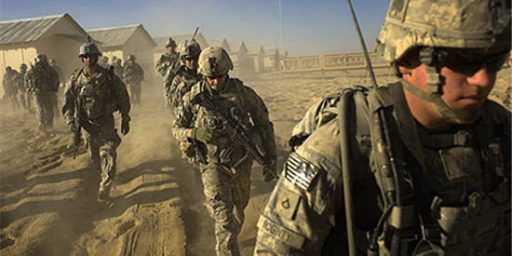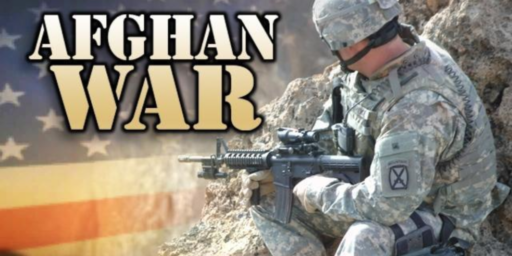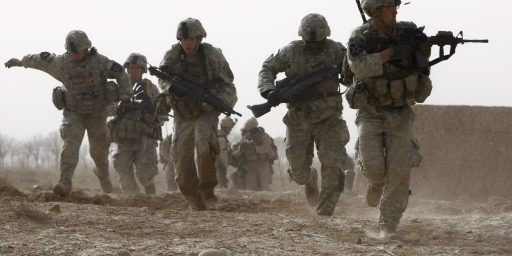ISAF Severely Curtails Joint Patrols With Afghans
The rising trend of Green On Blue attacks in Afghanistan has led coalition forces to cut back on joint operations with Afghan forces:
KABUL, Afghanistan — After years of tightly intertwining its forces with Afghan troops, the American-led military coalition has sharply curtailed ground-level operations with the Afghan Army and police forces, potentially undercutting the training mission that is the heart of the Western exit strategy.
The new limits, which were issued Sunday and require a general’s approval for any joint work at the small-unit level, was prompted by a spike in attacks on international troops by Afghan soldiers and police over the past six weeks. There was also fear that anger over an anti-Islam movie could prompt more of what the coalition calls insider attacks, American officials said.
Coalition officials stressed that their officers would still be paired with higher-level Afghan units, and that the basic concept of training, advising and fighting alongside Afghan units in the field to ready them to fight on their own remained at the core of war strategy.
The advisory mission is “the way ahead. It is still valid,” said Army Lt. Col. Richard W. Spiegel, a coalition spokesman.
“We are not stepping away from this,” he added. “Things might look a little different, but we’re not walking away.”
Coalition officers said the order to curtail direct cooperation covers all work done with Afghan forces below the level of a battalion. An American battalion has about 700 to 800 troops, though some are larger or smaller, and is designed to be the smallest unit that can fight independent of a higher command.
But in Afghanistan, where the Taliban blend easily and often strike in small groups, most of the combat goes on far below the battalion level, with small squads of about 10 men or platoons of about 15 to 40 soldiers or Marines.
Many of the day-to-day interactions between coalition and Afghan forces, such as joint patrols and meetings with village elders, also take place in small groups. Sometimes, even recreation is shared, with Afghans and foreign troops playing volleyball or working out together at one of the scores of small, shared combat outposts spread across the country.
“Clearly, we’re going to be seeing less of that,” Colonel Spiegel said.
But, he stressed, work at those levels with the Afghans would not cease completely. Rather, any operations below the battalion level now must be approved by one of the five coalition regional commands in Afghanistan.
Most officials insisted the change would not have a huge impact or alter the basic American strategy. “No one should interpret this as anything more than a prudent response to recent events. We remain committed to our goals and strategy in Afghanistan,” said George Little, the Pentagon spokesman, speaking to reporters during a trip to China.
At a news conference on that trip, Defense Secretary Leon E. Panetta said: “We are concerned with regards to these insider attacks and the impact they are having on our forces.” Gen. John R. Allen, the top NATO commander in Afghanistan, “has reflected that in the steps that he has taken,” Mr. Panetta said.
The steps are, of course, prudent and appropriate, but one has to wonder what impact all of this will have on the supposed goal of what are supposed to be our last years in Afghanistan to turn over security operations to the Afghans. If we cannot trust the Afghan forces, how are we going to train them?






I suspect that after the political season the timeline will be accelerated.
Or perhaps I hope.
We are doing what the Taliban wants us to do, behaving in a predictable manner to this problem. We are going to leave Afghanistan quicker than expected and will leave Karzai’s government to fend for themselves and abandon them to their fate. I think Karzai expected as much, and probably have plans to leave pretty soon after our troops do.
It strikes me that Romney’s inability to attack Obama today over his failed Afghanistan policy will be the real cost of that leaked video.
Wait… What’s that? Romney has the same policy on Afghanistan as Obama except he wants us to stay there forever? Oh.
Never mind.